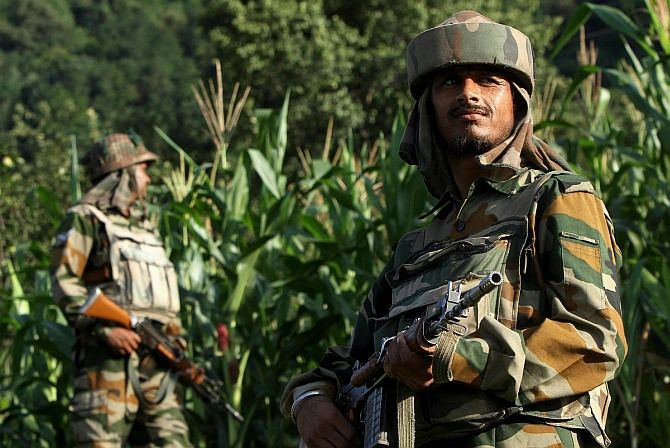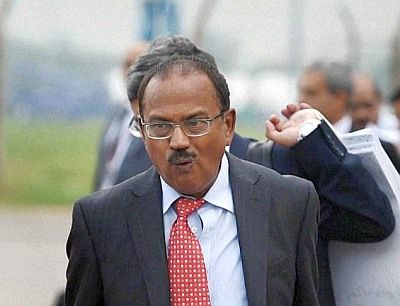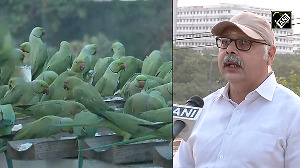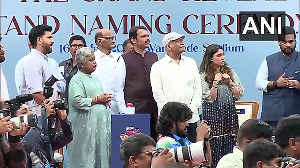'There cannot be any compromise on that.'
'After all, all instrumentalities of the State have been made to serve it. Why was the Constitution made? It was made to serve the cause of India.'

National Security Adviser Ajit Doval emphatically responds to a question if he justifies violence to maintain statecraft.
Doval, below, left, who was in Mumbai on August 4 to deliver the Lalit Doshi Memorial Lecture on 'State Security, Statecraft And Conflict of Values', shot from the hip, without mincing words on all the controversial questions posed to him.
Not that he has ever minced his words while crystalising "what is black and what is white," said a senior Mumbai police officer qualifying Doval's response which was in the context of Yakub Memon's hanging (though not openly so expressed by the questioner), the aftermath of which Doval monitored from the Maharashtra chief minister's residence in Mumbai that day.
While most people knows about Doval's no-nonsense approach his audience was surprised to see the 70-year-old former director of the Intelligence Bureau hold his own in a manner that not only informed, provoked, stirred them, but also revealed sharp wit.
Sample this Doval response in reference to how the media covered the Gurdaspur terror attack: "The media is very interesting entertainment for me. It is a good thing in the morning that makes you laugh. Not that whatever the media is saying or writing is right. But then how wrongly the right can be projected and how many people can remain disinformed."
Here's how the open session panned out at the end of Doval's 32-minute lecture as Prasanna D Zore/Rediff.com listened in.
You mentioned statecraft and conflict of values. Post Ufa (Russia, where the prime ministers of India and Pakistan met in July) in order to counter the Pakistani backlash you happened to speak with (Pakistan) Ambassador (high commissioner) Abdul Basit thrice without involving the ministry of external affairs... it supposedly had undermined the MEA and embarrassed them to some extent.
Diplomats in Delhi have mentioned that your counterpart Sartaj Aziz would never have done this to Indian Ambassador (high commissioner in Pakistan) T C A Raghavan.
So when the core (issue) is State security, how do these little issues of protocol straitjacket you in terms of your deliverance because I know in government hierarchy plays a very important part and your speaking with the Pakistani ambassador has hugely embarrassed the MEA .
Note: This question came from a former IAS officer, the same civil services batch as Doval's, from the Maharashtra cadre.
Firstly, your facts are not right and I am not going to correct them (laughter).
Secondly, this has got nothing to do with conflict of interest. It has got something to do with what you consider as urgent. When at Ufa it was agreed that there would be no (cross) border firing and the Pakistanis started firing.
It was absolutely necessary to tell them without any loss of time that you stop it, otherwise we will retaliate. And we will retaliate with effect.
This message was concurrently given to our high commissioner in Islamabad and to the high commissioner of Pakistan here at five minutes past seven in the morning.
It was the time of Ramzan; rozas were there and we thought that they will not (fire during Ramzan)... and whatever happened after that I am not going to tell (it here).
So, when there is immediacy you do not go into who should be talking to whom; if there is a police commissioner sitting here and here is somebody whose life has to be saved, then he will not wait for the constable to save the life of that person, but he will himself jump to save the life of that person. So, there is no question of any embarrassment to anyone.
Sushma Swaraj, was in any case, not there at that time. There is no such thing that the PMO dictates the terms. It is all team work; and we all work very, very closely as team.
Sometimes, there is a conflict between the important and the immediate. And someone does not know if one should do something that isn't important or something that is immediate. But when there is a convergence of 'important' and 'immediate' and thereafter too you go through bureaucratic procedure then I think you do not deserve to be in the place where you are.
If it is both important and immediate... so (I was) leading from the front.
Mahatma Gandhi said 'A tooth for a tooth and an eye for an eye will make the whole world go blind.'
How can our police with just rifles fight terrorists with sten guns?
The hanging of Yakub Memon really sent a positive signal that anybody who plays with the lives of citizens will be punished....
What do you think about these statements?
I am no one to challenge the great doctrine of the Father of the Nation that a tooth for tooth (will make all of us blind) and if retribution is the best policy. But the point is that you can do enough to see that the enemy does not try or think that it is a viable proposition for him to make an attempt on your tooth or your eye.
Deterrence (is important). That is a nation which has got strength and a credibility that this nation can use its strength should it be necessary, which does not mean that you are working for retribution (is enough to scare the enemy).
That if you go for physical fitness and you say that you are going to jog or run one hour everyday then you are not doing it for retribution. You are just keeping yourself fit.
Now the point is this if you make yourself a provocation for an assault by somebody else you are also partly responsible for it.
Your weakness is a provocation. And that weakness includes your unjustified tolerance. That is, you are not able to exercise power that you possess because you don't have the will to exercise that power. That is as good as not having it. Because power is not as good as you have it, but as good as you can exercise it.
It is just like money. I may have Rs 50,000 in my pocket, but still die of starvation if I decide not to spend it.
India has a mindset where it hits, it punches below its weight. We have to punch not above our weight, we have to punch not below our weight, but we have to increase our weight and punch proportionately (loudest applause).
About the terrorists having sten guns and our police having rifles is a debate I don't want to get into.
Rifles are in no way inferior to the guns, but yes, the point that you have made that when the police forces use rifles which have a smaller range (and puts them at a disadvantage), but they (rifles) have different types of uses.
While AK-47s and sten guns may have great bursts of fire it also means that if you fire in a position of automatic firing, you fire only for five seconds and then the magazine is over. In the rifle, with same amount of bullets or ammunition that you are carrying, you can engage a chap (terrorist) for a much longer time. So, there has to be a combination.
Rifles are also important; sten guns are important; carbines are important; but having said that requisite weapons and hardware must be given to our police and armed forces... I totally agree with you.

We have a huge army, navy and air force and a huge security establishment. Still we are not able to get Tiger Memon or Dawood Ibrahim back.
You have raised two questions. One is about comprehensive national power and another is about the convertibility of that power. In the context of the State convertibility of the power (that the State possesses and reserves the right to use it for the protection of the Nation State) is not always possible.
What do you do with somebody who has picked your pocket and you have a huge armour, tanks or battalion with you? You will not be able to convert this (to catch the thief).
A big army or a navy or an air force is to deal with a threat coming from the F16s from Pakistan or DF21 missiles from China and we will say that we have these things (to defend ourselves).
These (a large army) are not for somebody who is living as a fugitive (Dawood Ibrahim/Tiger Memon), under the protection of some intelligence agency (Pakistan's Inter Services Intelligence) in some guarded place. So, the inter-convertibility is not always there.
You may have legal power, but you cannot automatically convert that legal power (to achieve your goals). There is a due process through which you can do it.
So, are we a country of 100 crore plus people? Are we a powerful country? There is no doubt about it! Are we an emerging economic power? We are! And we will be much ahead in the next few years is what I am very sure about.
Now, if it is a challenge, then the State must develop those types of capabilities to meet the covert threats.
And what can be done, I don't think that is a matter to discuss in a place like this, but yes whatever has to be done will be done. But there is no point in denouncing (that we can't capture a fugitive despite) having a big army and the administration and defence minister is useless because there is one particular type of a threat.
All tools (at a State's disposal) cannot be used (to capture or bring a fugitive to India or make him face the law of the land). You cannot fix a string with a screw driver.
You have become active again seven years after your retirement. Pray, what's the secret! Inspire, all those retired officers here with your tips. How do you keep yourself abreast of what is happening around you, how do you keep yourself informed, so that the retired officials in the audience here can also think of getting an opportunity like you did after retirement!
There are several assumptions that you have made about me, but I think I will accept them because they are in my favour (roar of laughter).
You assume that I am updated; you assume that I am abreast and I am fit. Maybe, may not be. Only time will prove this.
As for keeping oneself updated I can say that your mind is like a sponge. Greater the pores in the sponge, the less filled it is with muck; greater is its capacity to absorb water.
Keep your mind away from petty jealousies, small personal rivalries, who is doing what and who is talking what and things like that.
(When you do that) you are taking away the tremendous capacity of your mind, you waste a large part of your brain and how can you expect to mop the floor with the residual of your brain and expect that it will clear all the water from the floor?
There is a feeling that India couldn't catch Tiger Memon so they have caught his younger brother and executed him. Your comments...
I think this (impression) is completely wrong. I don't agree with it at all. The fact that India should take Tiger Memon to the logical, judicial whatever is the consequence of that (his actions)... but it is not this or that.
Yakub Memon's a standalone case. Tiger Memon's a standalone case. It is like saying if you can't do anything to me you will slap my grandchild. That is no revenge. That is not consequence management.
So, there were certain things against Mr X (Yakub Memon). He was tried through the due process of law and the same applies to B (Dawood Ibrahim) and C (Tiger Memon) and the same applies to everyone (guilty of committing acts of terror against India).
Did the media blow the Gurdaspur terror attack out of context? If you read a lot of news reports it seems they suggest it is a precursor to lot of things to happen. What do you think?
Are you talking about my reading about reading the media? (laughter from the audience).
Media is a very interesting entertainment for me. (applause and laughter). It is a good thing in the morning that makes you laugh. Not that whatever the media is saying or writing is right. But then how wrongly the right can be projected and how many people can remain disinformed.
Probably they also have got their own compulsions. Everything has got a pecking order of priorities. You are writing a newspaper so that it can sell. You are having a TV programme then there are TRPs (to think about).
I have got my own pecking order of priorities based on my requirements. Why should I impose mine (priorities) on them? So, they can well say that Mr Doval, national security is your problem, you do that. Let us do the journalism.
And my only point is this that at some point national interest is supreme for all of us because if you can't sail together, we can sink together. The day we sink, all this freedom of press or the freedom of the individual that will also sink. So that these rights remain secure the country has got to remain secure and strong.
Do not do anything that will create schism between the ranks of the people, creates cynicism among the masses, give them a sense of defeat and a sense of helplessness. Make a strong nation.
Nations are as strong as the national will is and what the people think.
Let us keep our communities together, let us keep our people in a healthy mental and intellectual state of mind and the cynicism that is sometimes created that you start losing the confidence in all institutions that is very bad for a nation.
If you working in a group, school, or organisation or university and everybody thinks that everybody else is incompetent or corrupt or mixed up, that will be something disastrous (for the nation).
Let us have faith in every Indian, that every Indian is doing his best, everybody is doing their duties to the best of their abilities and if you are not able to comprehend (it) fully then probably we should give the benefit of doubt to them and I give it to the media.
I have spoken and interacted with people in the media all over the world and I can tell you that we have got some of the finest brains in the world (applause)... the question is this... their problem is this... sab log toh padhte hi hai (everybody reads whatever we publish)... be it a petty crime story or human weakness stories because that is what is spice and that is what people read....
Now this is a vicious circle. You write it so people read it... people read it they get interested so you write more of it so they get more interested and you are interested. But, where is serious journalism?
There are many other things that are happening in this country beyond what is being written about. It is bad that we try to denigrate our own selves, we try to show the negative part of our character, our nation, but there are lot of positive things happening.
Will you justify violence to maintain statecraft?
Absolutely yes! (Applause.) There is no doubt in my mind. But there are riders. Through rightful processes, through a way which is in consonance with the nation's law, its Constitution, its established values and which are in the interest of the nation.
It is not that you approve the violence by the State in an indiscriminate way. That is not approvable, but definitely should it come to protect the supreme interest of the nation there is nothing that should stop the nation.
It (the State) should go to any end. There cannot be any compromise on that.
After all, all instrumentalities of the State have been made to serve it. Why was the Constitution made? It was made to serve the cause of India.
Now, there was somebody who asked who decides it (what serves the interest of the nation)?
In a democracy the majority decides it (what serves the interest of the nation). Please contest the next election (to the person who raised the question) and you will know who decides it!











